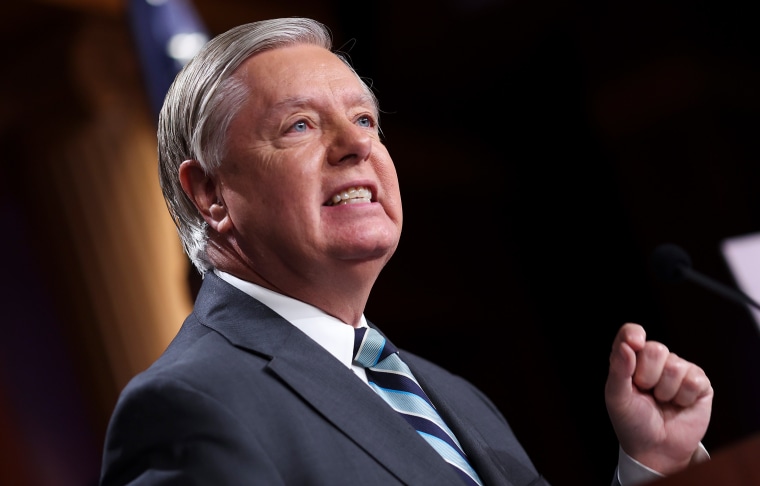Republican Sen. Lindsey Graham of South Carolina is warning everyone that if Donald Trump ends up being charged for his Mar-a-Lago cache of classified documents, there’ll be mayhem in America. “If they try to prosecute President Trump for mishandling classified information after Hillary Clinton set up a server in her basement, there literally will be riots in the street,” he said Sunday in a Fox News interview. “I worry about our country.” Graham, in fact, made the point about “riots” twice — it wasn’t an extemporaneous turn of phrase, but a talking point.
That talking point was more than just a prediction. It was also a threat.
Graham isn’t a disinterested social scientist forecasting the future of the Trump movement. He’s a powerful conservative politician, one of the most influential Trump sycophants on Capitol Hill, and he was talking to the most influential conservative media outlet in the country. While he expressed a general “worry” about the nation, he didn’t condemn the idea of the riots that he said would follow a Trump indictment. And his comments about the incitement of riots cast blame on the Justice Department, instead of on the man with a history of grotesque abuse of power who absconded to Mar-a-Lago with sensitive documents.
Trump and his allies ultimately have an interest in promoting self-fulfilling warnings of chaos.
It should surprise nobody that Trump swiftly shared Graham’s remarks on his failing social media platform, Truth Social. Trump picked up what Graham was putting down: the need to spread the message that the Justice Department should be afraid of the backlash that could follow from charging him with violating federal criminal statutes. Any hypothetical conviction following that hypothetical indictment could result in decades in federal prison — a worrying prospect, indeed, for the former president.
Graham’s allegation that the Justice Department has a double standard for Trump relative to Clinton are unpersuasive, since, among other things, Clinton, the former secretary of state and 2016 presidential candidate, cooperated with the investigation of her personal server, thereby eliminating the need for a search. And the fact that the FBI’s investigation of Clinton — which experts say entailed bigger departures from protocol than the Trump investigation has so far — actually helped Trump secure the presidency should remind us that the FBI is far from a partisan, anti-Trump agency.
The defects in Graham’s analogy don’t actually matter to him, though. Trump and his allies ultimately have an interest in promoting self-fulfilling warnings of chaos and a harsh political price for the U.S.’s federal law enforcement apparatus. The Justice Department knows that its investigation is extremely politically sensitive, and any decision to press charges would involve weighing the social and political costs. If the right-wing narrative takes hold — that the Justice Department is just a deep-state monster out to kill freedom — the higher those costs become. At risk would be the department’s reputation as an independent arbiter. And while it's not the Justice Department's job to factor considerations about stoking the rise of a more powerful proto-fascist movement into its decisions, it's inconceivable that it isn't factoring that in. (Of course, as I’ve argued, the cost of refusing to act purely out of fear of backlash sets a dangerous precedent for lawless presidential power.)
Graham and the GOP’s commitment to making the Justice Department too nervous to enforce the law could work and compel the department to back down from charging Trump even if they have a strong case. In the process, figures on the right like Graham will have sown the seeds for even fiercer authoritarianism and lawlessness in Trump’s potential third presidential campaign.
Perhaps the saddest part of this is how so much the Republican Party is, once again, declining to use an opportunity to rid itself of Trump. If right-wing media and politicos didn’t treat the FBI’s actions as Stalinist overreach but as a possibly reasonable case against a man with a history of absurd abuse of power, this could possibly help clear the 2024 field for Florida Gov. Ron DeSantis or another Trump challenger. But once again we see that much of the GOP doesn’t actually see a problem in Trump. Instead, it’s willing to co-sign a project of potential violence to help him return to power.

